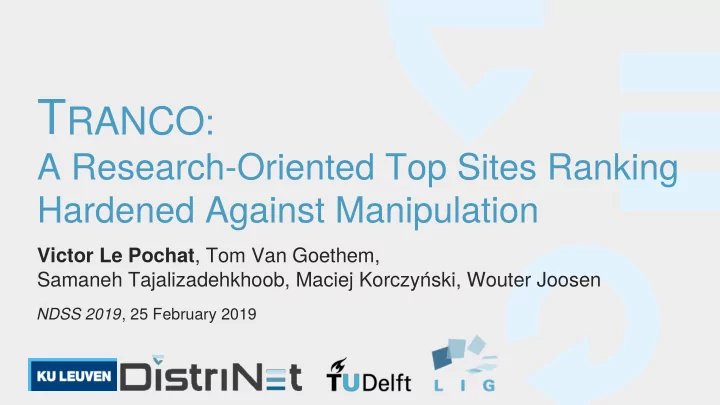

T RANCO : A Research-Oriented Top Sites Ranking Hardened Against Manipulation Victor Le Pochat , Tom Van Goethem, Samaneh Tajalizadehkhoob, Maciej Korczyński, Wouter Joosen NDSS 2019 , 25 February 2019
Security researchers rely on top websites rankings “We perform a comprehensive analysis on Alexa’s Top 1 Million websites” “We collected the benign pages from the Alexa top 20K websites” “The list of websites we chose for our evaluation comes from the Alexa Top Sites service, the source widely used in prior research on Tor” [1, 2, 3] 2
3
Scheitle et al.: [4] 4
Browser vendors make security decisions based on top websites rankings “While the situation has been improving steadily, our latest data shows well over 1% of the top 1-million websites are still using a Symantec certificate that will be distrusted.” https://blog.mozilla.org/security/2018/10/10/delaying-further-symantec-tls-certificate-distrust/ 5
We studied four free, large and daily updated top websites rankings 6
How do these rankings affect research? Can malicious actors abuse the rankings? Can we improve ? 7
Inherent properties → affect Large-scale manipulation → abuse A new ranking: Tranco → improve 8
Inherent properties → affect Large-scale manipulation → abuse A new ranking: Tranco → improve 9
Inherent properties can skew conclusions of studies 10
Inherent properties can skew conclusions of studies 11 › Low agreement
Inherent properties can skew conclusions of studies 12 › Low agreement › Varying stability
Inherent properties can skew conclusions of studies 13 › Low agreement › Varying stability › Unresponsive sites
Inherent properties can skew conclusions of studies 14 › Low agreement › Varying stability › Unresponsive sites › Malicious sites
Inherent properties can skew conclusions of studies Inherent properties of rankings impact the validity and reproducibility of research 15 › Low agreement › Varying stability › Unresponsive sites › Malicious sites
Inherent properties → affect Large-scale manipulation → abuse A new ranking: Tranco → improve 16
Malicious actors have incentives to manipulate rankings incentive to manipulate achieved by promoting whitelisting malicious domains own domains hiding malicious practices other domains changing prevalence of issue 'good'/'bad' domains 17
With large-scale manipulation of rankings, fingerprinting providers can remain undetected 18 [5, 6]
Simple, low-cost techniques make this manipulation possible on a large scale 19
Simple, low-cost techniques make this manipulation possible on a large scale 20 A single request is sufficient to get into the top million › Alexa: browser extension
Simple, low-cost techniques make this manipulation possible on a large scale 21 A malicious actor can easily reach a very good rank › Alexa: analytics script 28798
Simple, low-cost techniques make this manipulation medium medium low Analytics script Quantcast medium high none Reflected URLs high high high Backlinks Majestic low low possible on a large scale none 22 Monetary Effort Time Alexa Extension medium Cloud providers low Analytics script medium medium high Umbrella high
Simple, low-cost techniques make this manipulation high Backlinks high high high Reflected URLs none medium low Quantcast Analytics script low medium high Malicious actors may want to manipulate rankings, Majestic medium possible on a large scale none 23 Monetary Effort Time Alexa Extension medium low low Analytics script medium medium high Umbrella Cloud providers and such manipulation is feasible at a large scale
Inherent properties → affect Large-scale manipulation → abuse A new ranking: Tranco → improve 24
Tranco: an improved approach to top sites rankings Other combinations of providers/days Filters on specific services Remove unresponsive/malicious sites [7] › Aggregate existing rankings intelligently › Default settings: all providers, 30 days › Customizable: tailor to purpose of study 25
Tranco improves on properties important for research 26
Tranco improves on properties important for research 27 › Stability
Tranco improves on properties important for research 28 › Stability › Reproducibility
Tranco improves on properties important for research 29 › Stability › Reproducibility › Manipulation
Tranco improves on properties important for research 30 We provide Tranco, an improved ranking that is more suitable for research and is hardened against manipulation › Stability › Reproducibility › Manipulation
We demonstrate how these rankings can affect research results We uncover how attackers can abuse rankings to influence research results We provide Tranco, an improved ranking to strengthen security research 31
https://tranco-list.eu/ https://github.com/DistriNet/tranco-list Get the source code: Download the Tranco ranking: 32
Thank you! victor.lepochat@cs.kuleuven.be
References Long Way to the Top: Significance, Structure, and Stability of Internet Top Lists,” in Proc. IMC, 2018, pp. 478- Nauru and Slovenia,” Australian Journal of Political Science, vol. 49, no. 2, pp. 186–205, 2014. J. Fraenkel and B. Grofman, “The Borda count and its real-world alternatives: Comparing scoring rules in 7. 2016, pp. 1388–1401. DOI: 10.1145/2976749.2978313 S. Englehardt and A. Narayanan, “Online tracking: A 1-million-site measurement and analysis,” in Proc. CCS, 6. tracking mechanisms in the wild,” in Proc. CCS, 2014, pp. 674–689. DOI: 10.1145/2660267.2660347 G. Acar, C. Eubank, S. Englehardt, M. Juarez, A. Narayanan, and C. Diaz, “The web never forgets: Persistent 5. 493. DOI: 10.1145/3278532.3278574 Scheitle, Q., Hohlfeld, O., Gamba, J., Jelten, J., Zimmermann, T., Strowes, S.D., & Vallina-Rodriguez, N., “A 1. 4. 10.14722/ndss.2018.23105 Automated website fingerprinting through deep learning,” in Proc. NDSS, 2018. DOI: Rimmer, V., Preuveneers, D., Juarez, M., Van Goethem, T., and Joosen, W., 3. Proc. SP, 2018, pp. 70-86. DOI: 10.1109/SP.2018.00044 Kharraz, A., Robertson, W., and Kirda, E., “Surveylance: Automatically Detecting Online Survey Scams,” in 2. 10.1145/3243734.3243858 In-depth Look into Drive-by Cryptocurrency Mining and Its Defense,” in Proc. CCS, 2018, pp. 1714-1730. DOI: Konoth, R.K., Vineti, E., Moonsamy, V., Lindorfer, M., Kruegel, C., Bos, H., and Vigna, G., “MineSweeper: An 34
Estimated number of forged requests 35
Limitations Still works with 3 other lists Change is permanently recorded and mentioned on list page No, we rely on manipulable sources, but the required effort is higher We are looking into more permanent archival (OSF) 36 › What if one list goes down? › Completely resilient to manipulation? › How permanent is the link?
Recommend
More recommend